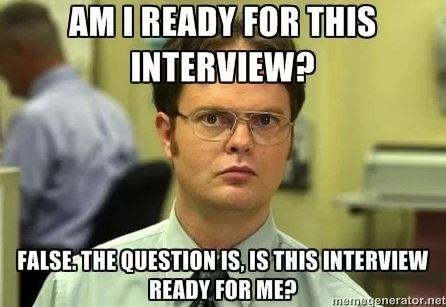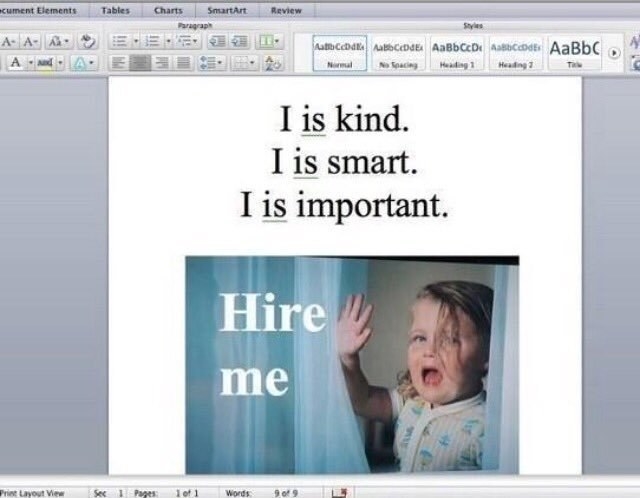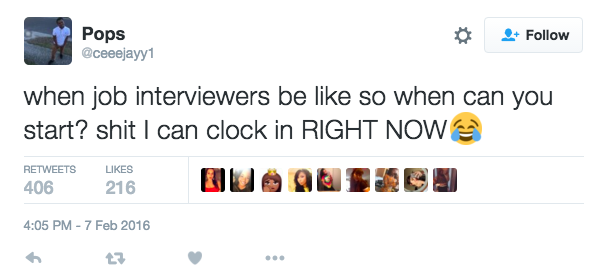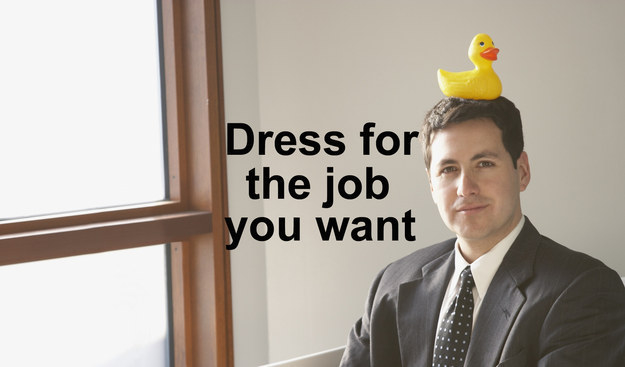We asked the BuzzFeed Community to send us their best tips for getting a job right after college and what the class of 2017 should know about getting a job. Here are their responses.
1. Always keep trying, and don't let anything discourage you.
2. Apply to *A LOT* of jobs.
Ten applications a week. Use a spreadsheet to keep track of those applications. Write company-specific cover letters.
Commit to submitting five cover letters and résumés per week, minimum. Send them then forget them, at least until you get a reply. Dragging your feet while you wait to hear from your dream job and then being sad that you didn't get a response is a waste of time. Crank out those applications and don't look back.
Do not assume you can't get a job just because you're insecure. Apply for everything that interests you.
—Alicia Kistner-King, Facebook
3. But don't *just* dump your résumé into the ether — follow up.
4. Don't hesitate to start applying before graduation day.

5. Apply to internships to start in the summertime, too, even if you're also applying for jobs.
If you can, try to set up an internship before you graduate, even if it's not paid. Get your foot in the door, and get an idea of what you're getting yourself into.
6. Find your industry's niche job sites and use the job listings to tailor your résumé.

7. Learn to use LinkedIn like a pro (without paying for Pro).
I found the best postings on LinkedIn, and recruiters actually directly contacted me. I prepared for interviews by learning a lot about the company and re-reading the original job posting to refresh my memory. I had probably upwards of 10 interviews and received four job offers before the start of the spring semester senior year.
8. Actually visit your school's career services, and talk to your professors for help and recommendations.
9. Look at state and local government agency pages for even more listings.
I was working towards a master's in environmental sciences, so I applied to my state agency's (paid!!!) internship and was accepted into an air quality–related position. I spent three months learning how the federal government and state government apply air quality–related laws. Those skills allowed me to apply for full-time positions with the same agency and stand out from the other applicants.
Then make sure those skills you learned are clearly presented in your résumé/cover letter, etc. And those recommendations from respected members of your industry never hurt.
—John Bregger, Facebook
10. Actually read and follow all the instructions on the job application.
I own a dog-walking business and hire a lot of young people, and the biggest thing I look at is whether they followed the (very clear) instructions on the application. If they didn't, I immediately toss them out.
11. Look to your classes to help show interest or experience in something that wasn't your major.
12. Make other people read your résumé for typos and grammar mistakes before you send it out.

13. If you speak other languages, flaunt them on your résumé! (But don't lie.)
Languages are GOLDEN — if you speak a second (or third) language, leverage that with international companies! I found a job that fit my strengths like a glove, and I've had the opportunity to grow and set myself apart since I started it 1.5 years ago.
14. Pick up your phone and call.
15. Embrace the awkwardness of networking, and practice to get better at it.

16. Sign up at a temp agency to tide you over and open up opportunities.
17. Find a geographical area where there's a need for your skills, and apply for jobs there.
Where I live, it helped that not a lot of students graduate with my degree (library science), and that many companies were looking for librarians. I stayed for 10 months in my first job, and I just celebrated my 15th year with my second and current job.
18. Look for volunteer work you can do that's relevant to your industry or field.

19. Go to *EVERY* interview, if only just to practice going to interviews.
20. When you get an interview, research the company so you come armed with information.
Knowing the company shows you're serious about the position and helps you prep questions you have about the company, position, benefits, and day-to-day. Even if your questions are answered during the interview, it looks good to come prepared.
We all know you want money — tell us why you applied HERE for money.
—Cara Wood, Facebook
21. Be on time, be friendly, be persistent, be positive.
22. If you're critiqued during an interview, take it in stride.
Always accept critiques and the fact that you might need to start from the very bottom. A good attitude can make the difference between getting hired or not, especially for creative jobs.
23. Be honest, and use your research to answer the dreaded "strengths and weaknesses" question.
Being honest about inexperience and what you don't know but showing an earnest desire to learn really impresses employers. It shows integrity and a good work ethic, and makes you seem humble and truthful when you do showcase your strengths and experience. Saying "I don't know but I'm very excited to learn" landed me my dream job!
And instead of studying those generic answers to the question "What are your weaknesses?", research the specific tasks of the position you've applied for, pick one or two things you have little experience in, be honest about those, and express the desire to learn.
—kumo
(Hint: Those specific tasks are probably written out in the original job listing.)
24. Send a thank-you note or email after every interview.
25. Don't take a job you aren't excited about, no matter how much it pays.
Give up now! Just kidding. Do something because you love it, not because of how much it pays. If you pick a profession you hate you're just gonna re-evaluate and start over at 30.
26. OR accept a just-okay job, and focus on the bigger picture.

27. Don't shy away from entry-level work, even if it's tedious.

Still have a year or two left before graduation day?
28. Apply for and accept and go to internships!

29. And during those internships, network both at your internship and at networking events your internship opens up.
I took my internship seriously and worked as though I made 100k. I also did tons of networking and attended conferences and seminars. Even though I didn't get a permanent position where I interned, a former coworker who had left for another company called me and asked if I'd be interested in working there because she was impressed with how hard I worked as an intern and how invested I was in the profession.
30. But also be informed about what you can legally be made to do at unpaid internships in your state, and don't take abuse.
Read up on what companies are legally allowed to make you do during internships.
—metm
31. If you can't go the unpaid internship route, have a summer job of some sort.
32. Don't forget that now is the chance to *start* networking.

33. If you're not sure where to find networking opportunities, look to major- or career-related clubs on your campus.
I joined clubs at school that provided networking opportunities. I went to all the events and met employers who called me for an interview and eventually an offer. —Syd Evans, Facebook
And if you're still a freshman...
34. Get your butt out of bed on every career fair day.
Want more help? Check out 15 Easy Tips For Scoring Your Dream Job In Your Twenties.
Note: Submissions have been edited for length and/or clarity.
